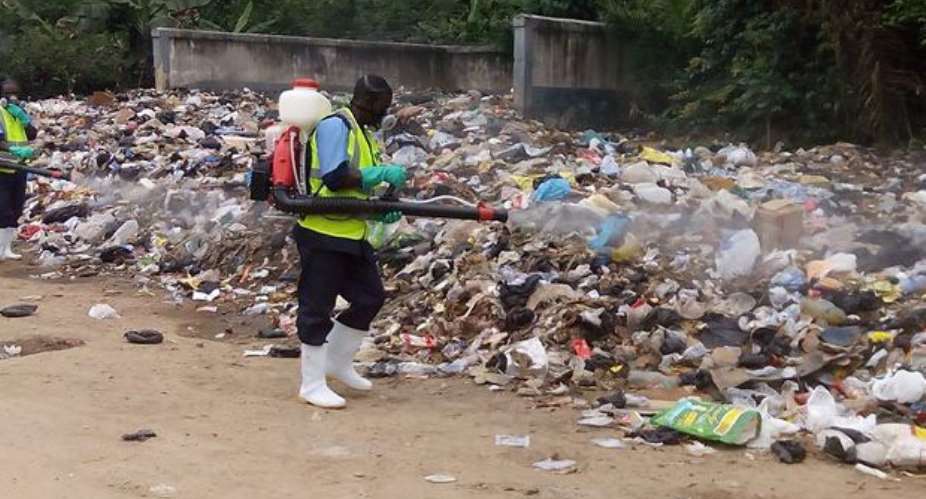It is not the very first of its kind of story. I am referring to the incident that recently, reportedly, occurred in the Kejetia district of Kumasi-Central, the Asante regional capital, in which a young woman caught chucking garbage out of the window of a moving car, we are told, was forced to alight by a police officer and ordered to collect all the pieces of litter on an entire stretch of a street (See “Policeman Forces Woman to Collect Street Garbage for Littering” Classfmonline.com / Ghanaweb.com 7/13/19). I have also been whatsapped the scene of an Indian national resident and working in Ghana who was caught dumping plastic waste along a stretch of the Accra-Tema Motorway, by a young private Ghanaian citizen and was also forced by the young man, who videotaped this socially irresponsible foreigner doing his ungodly thing, to promptly pick up after himself, as New Yorkers are wont to say.
My favorite pick of these distasteful acts of gross civic irresponsibility is one that involved a middle-aged Chinese-born Ghanaian resident who was, reportedly, caught, pants down, hung and all, defecating on his Ghanaian neighbor’s side of an open boundary which these two homeowners shared. In this instance, as well, the culprit was promptly forced by some socially responsible and patriotic Ghanaian citizen onlookers to clean up after himself. In the latter scenario, as well, we are told that the Chinese homeowner had rather disgustingly ordered his Ghanaian driver to scoop up his employer’s fecal matter but was promptly asked to leave the poor innocent driver alone and lift up his own turd because, in New Yorkese, that is, the local dialect of New Yorker, the excrement came from the Chinaman’s own “butts.”
Now, this is the sort of good and socially responsible journalism that I love to devour from many a Ghanaian media portal on any bright and sunny day of the week. But, of course, what is even more significant to learn and observe about these three separate incidents is the fact that these disparate antisocial acts are clearly informed by the inescapable fact that having lived in our country for quite sometime now, these rude and obnoxious alien litterbugs and “shitholes,” my profound apologies to America’s President Donald John Trump, had quite aptly concluded that native Ghanaians, themselves, could care less about their own environmental hygiene culture. Fortunately, Ghanaians appear to be fast wising up to the imperative need to keep their surroundings clean and healthy.
These “divine” acts of proactive social responsibility ought to be unreservedly applauded. I also hope that both the National Commission for Civic Education (NCCE) and the Ministry of Health and Sanitation have had a central role to play in this most laudable environmental health awareness policy initiative. It also goes without saying that to be effective, each and every state institution, as well as individual Ghanaian and non-Ghanaian citizens, must get involved. And for those of our regular readers who may not be aware of the same, it was this sort of preventive environmental hygiene culture that Dr. JB Danquah vigorously campaigned for the British colonial authorities to be fully engaged in, as a major health-policy initiative during the 1940s and 50s.
Indeed, legend has it that it was Dr. Danquah whose singular contribution to our rural development partly inspired the British colonial regime to establish the policy initiative of the “Tankasse” or Town Council Health Inspectorate System in the country. Under the latter regime, we had local government-sponsored professionally trained health inspectors who regularly toured Ghanaian towns and villages during the colonial era and well into the postcolonial era of the 1960s and 70s, as this writer vividly recalls (See Okoampa-Ahoofe, Jr’s political biography titled “Dr. JB Danquah: Architect of Modern Ghana” iUniverse.com, 2005).
There are, of course, many cost-cutting benefits accruing from the implementation of such environmentally protective health policy initiatives, not the least bit of which is a significantly improved quality of life and a remarkable increase in the country’s Life-Expectancy Rate, as well as a drastic and savvy reduction in our national healthcare budget. And then the government can logically and meaningfully crack the whip on such garbage-collection monopolies as Mr. Siaw-Agyepong’s Zoomlion sanitation network.
*Visit my blog at: kwameokoampaahoofe.wordpress.com Ghanaffairs
By Kwame Okoampa-Ahoofe, Jr., PhD
English Department, SUNY-Nassau
Garden City, New York
July 13, 2019
E-mail: [email protected]





 Lay KPMG audit report on SML-GRA contract before Parliament – Isaac Adongo tells...
Lay KPMG audit report on SML-GRA contract before Parliament – Isaac Adongo tells...
 Supervisor remanded for stabbing businessman with broken bottle and screwdriver
Supervisor remanded for stabbing businessman with broken bottle and screwdriver
 NDC watching EC and NPP closely on Returning Officer recruitment — Omane Boamah
NDC watching EC and NPP closely on Returning Officer recruitment — Omane Boamah
 Your decision to contest for president again is pathetic – Annoh-Dompreh blasts ...
Your decision to contest for president again is pathetic – Annoh-Dompreh blasts ...
 Election 2024: Security agencies ready to keep peace and secure the country — IG...
Election 2024: Security agencies ready to keep peace and secure the country — IG...
 People no longer place value in public basic schools; new uniforms, painting wil...
People no longer place value in public basic schools; new uniforms, painting wil...
 'Comedian' Paul Adom Otchere needs help – Sulemana Braimah
'Comedian' Paul Adom Otchere needs help – Sulemana Braimah
 Ejisu by-election: Only 33% of voters can be swayed by inducement — Global InfoA...
Ejisu by-election: Only 33% of voters can be swayed by inducement — Global InfoA...
 Minority will expose the beneficial owners of SML, recover funds paid to company...
Minority will expose the beneficial owners of SML, recover funds paid to company...
 Prof. Opoku-Agyemang has ‘decapitated’ the NPP’s strategies; don’t take them ser...
Prof. Opoku-Agyemang has ‘decapitated’ the NPP’s strategies; don’t take them ser...
